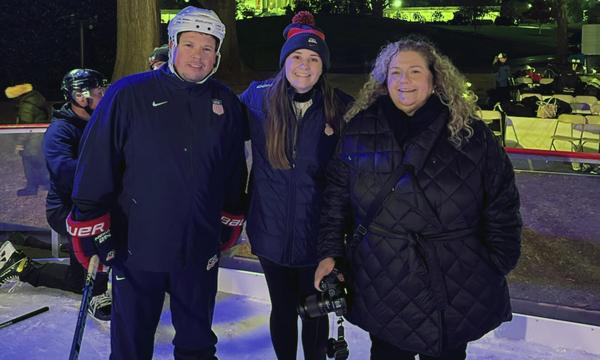The popularity of disabled hockey has grown exponentially within the last decade, with various disciplines that foster a more inclusive community to drive social change.
To continue that growth, Maureen Thompson-Siegel, chairperson for USA Hockey’s disabled section, relies on word of mouth and outside partnerships to let people know disabled hockey is an option for them.
“The more outreach, the more exposure that we get, the more people realize that the neighbor down the street who didn’t know hockey was an option for their child or family member [the better],” Thompson-Siegel said. “The more we promote it, the bigger and faster it will grow.”
Currently, there are six disciplines recognized and supported by USA Hockey throughout the nation: blind, deaf and hard of hearing, sled, standing and amputee, special and warrior hockey.
USA Hockey oversees several events within the disabled hockey discipline throughout the calendar year, starting with the Warrior Hockey Classic, Oct. 10-13 in Wesley Chapel, Florida.
A trio of events occur in November, including the Sled Hockey Classic, presented by the NHL, in Farmers Branch, Texas, (Nov. 7-10) and the Special and Blind Hockey Classic in Blaine, Minnesota, (Nov. 15-17). The Warrior National Championship is scheduled for April 24-27, 2025, in Coral Springs, Florida, and the Sled Hockey National Championship will take place May 1-4, 2025, at the same location.
“In my experience, when people come to special hockey events, particularly when they’re engaged in hockey, they see the pure unmitigated joy of the players and the fun they’re having,” Thompson-Siegel said.
Thompson-Siegel said the pandemic affected the disabled hockey programs, but participation numbers have greatly improved over the last couple years.
In five years, the warrior hockey category has grown by 307%, and 1,076% in the last decade, growing from about 100 competitors to a little more than 1,400 during the 2022-2023 season.
In five years, sled hockey has grown by 10% and 41% in the last decade, going from a little more than 1,000 participants to about 1,500 in the 2022-2023 season.
Thompson-Siegel said that USA Hockey partners with organizations like the Wounded Warrior Project and the U.S. Department of Veterans Affairs, among others, during events.
“We use the event to bring people together and give them easier access to things that help them in their daily lives,” Thompson-Siegel said.
Sled hockey events receive the same treatment.
“When we bring the sled community together, we have people who specialize in maintaining equipment, and we reach out to people who can help with prosthesis in case something goes wrong during a game,” Thompson-Siegel said.
At the younger levels, players look up to Paralympic gold medalists like Declan Farmer and Kevin McKee, among others, who play on the U.S. National Sled Hockey Team.
Thompson-Siegel said when players like that show up to events, the kids treat them like superstars.
She added that USA Hockey holds regional events, which are targeted at other disciplines so organizations can focus on growing locally, and they don’t have to travel across the country for large-scale tournaments.
Blind hockey has grown by 110% in the last five years and special hockey by 13% in the last decade. When USA Hockey holds events for blind and the deaf and hard of hearing disciplines, officials reach out to schools for the blind and deaf to try and engage and encourage bringing their students to Try Hockey for Free sessions, among other outreach programs.
Thompson-Siegel said that the NHL and local communities at large understand the significance and support for the disabled disciplines of hockey, as it ties into the Hockey is for Everyone campaign. She said the organization is partnering with the NHL to raise continued awareness, which includes putting together a video that can be shared and used on scoreboards during intermission breaks.
“We’re making people aware that there are opportunities for people out there with disabilities to participate in the sport,” Thompson-Siegel concluded. “When they get together, hockey is their thing. Hockey is the draw to get on the ice, but these players get their community from hockey. It’s more than just a sport.”
Story from Red Line Editorial, Inc.



